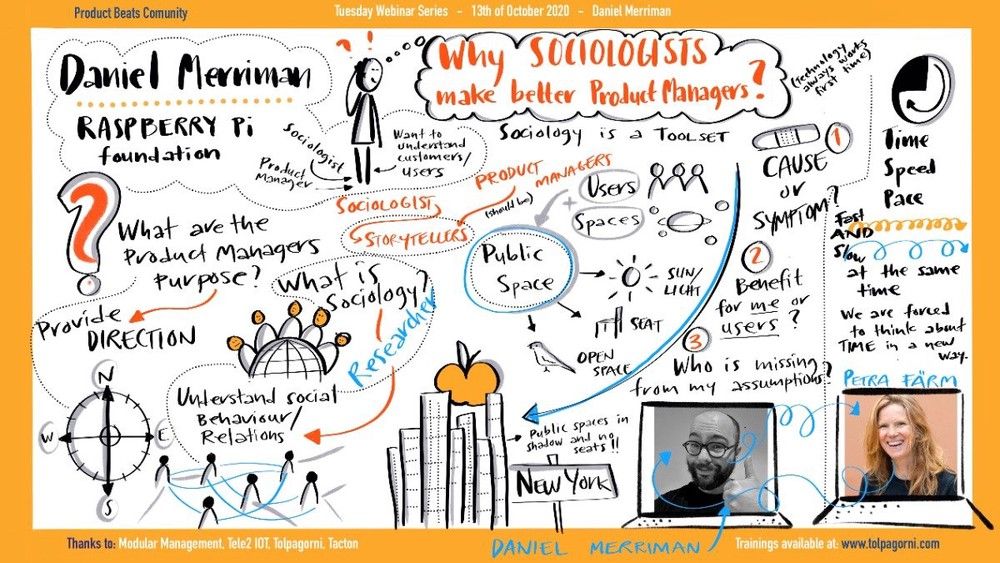Episode 29: Sociologists and Product Managers w/Daniel Merriman
13 October, 2020 / Host: PETRA FÄRM
Why Sociologists Make Better Product Managers
Sociology offers a unique and liberating perspective for product managers, as it allows us to understand how social processes work and how social change occurs. As David Newman argues in his book "Exploring the Architecture of Everyday Life," and as Daniel Merriman, a sociologist turned product manager, has noted, this perspective can help us consider the impact that our products have on society and how little we often consider the experiences of non-customers.
As product managers, we must consider the impact of our products on society, including non-users and the broader social context. This requires us to think beyond short-term gains and focus on creating a legacy that benefits society as a whole. By bringing a sociological perspective to product management, we can create products that have a positive impact on society and lead to a better world for all.
In this episode, we will delve into the role of a product manager and how the principles of sociology can be applied to make better product managers. We will also explore the benefits of having a sociologist as a product manager and why sociology is a liberating perspective for understanding the social processes that influence our thoughts, perceptions, and actions.
The Purpose of a Product Manager
To understand why sociologists make better product managers, we need to first examine the purpose of a product manager. The main responsibility of a product manager is to ensure that the right product is being built at the right time and for the right reasons. This is a critical role in any organization as it ensures that resources are being used efficiently and that the product is meeting the needs of its users.
However, many organizations conflate the role of a product manager with project management or diminish their scope to that of a feature broker trading development time. This can result in missed opportunities and a lack of focus on what truly matters.
The Value of a Product Manager
When an effective product manager is integrated into the product development process, they become the undisputed expert in their users and how they engage with the product. They challenge assumptions, push back on initiatives driven by biases, and pursue meaningful data with a religious zeal. They provide direction, a North Star to steer by, and a strong compelling narrative that tells everyone around them the story of the product and how it can make the lives of users better.
The Role of Sociology
So, what does sociology have to do with product management? Sociology is the study of social facts such as norms, values, and institutions. It provides a framework for understanding social groups through their interactions and power dynamics between people. The role of a sociologist is to bring rigor to humanities efforts to understand the myriad relationships between a person and their widest social world.
Sociology is a liberating perspective that forces us to look at the social processes that influence our thoughts, perceptions, and actions. It helps us see how social change occurs and the impact we can have on others. For a product manager, someone whose value lies in building actionable insight into the people who use their product, could any way of thinking be more useful? Could any skill set be more practical than that of a sociologist?
Benefits of Having a Sociologist as a Product Manager
A sociologist brings a unique perspective to product management. They are trained in research and critical thinking, which allows them to look beyond the assumptions of people and dig into the why. A sociologist can help product managers to understand their users on a deeper level, to identify their needs and pain points, and to create a product that truly meets their needs.
In addition to bringing a unique perspective, sociologists can also help to create a more diverse and inclusive team. They are trained to understand power dynamics between people and how they can impact social groups. This understanding can help product managers to create a team that is more inclusive, that values diversity, and that can create products that serve a wider range of users.
Takeaways
- The purpose of a product manager is to ensure that the right product is being built at the right time and for the right reasons. They are the expert in understanding users and their engagement with the product, and can challenge assumptions and pursue meaningful data to provide direction and a compelling narrative for the product.
- Sociology is the study of social facts, norms, values, institutions, and interactions between social groups. Sociologists bring rigor to understanding the relationships between a person and their wider social world, and can articulate the intangible power dynamics of social groups and their real-world consequences.
- Sociological thinking can be extremely useful for product managers, as it can provide insight into the context behind user behavior and the why behind the things they do. However, despite its usefulness, sociology is rarely listed as a requirement in product manager job descriptions.
Speaking of the importance of product management and the skills needed to excel in this field, it's worth mentioning The Productbeats Product Management Certification Program. This program offers a comprehensive curriculum designed to provide aspiring product managers and professionals with the knowledge, skills, and tools needed to succeed in the industry. From market research and user analysis to product strategy and development, the program covers all aspects of product management, giving participants a competitive edge in the job market. With the program's emphasis on real-world experience and hands-on learning, graduates are well-equipped to tackle the challenges of product management with confidence and skill.
You might also enjoy watching...
Copyright © 2026 ProductBeats AB

Get The Program Brochure
Submit the form below to have The Program Brochure delivered to your inbox
The title of the notification
The descriptive text of the notification


